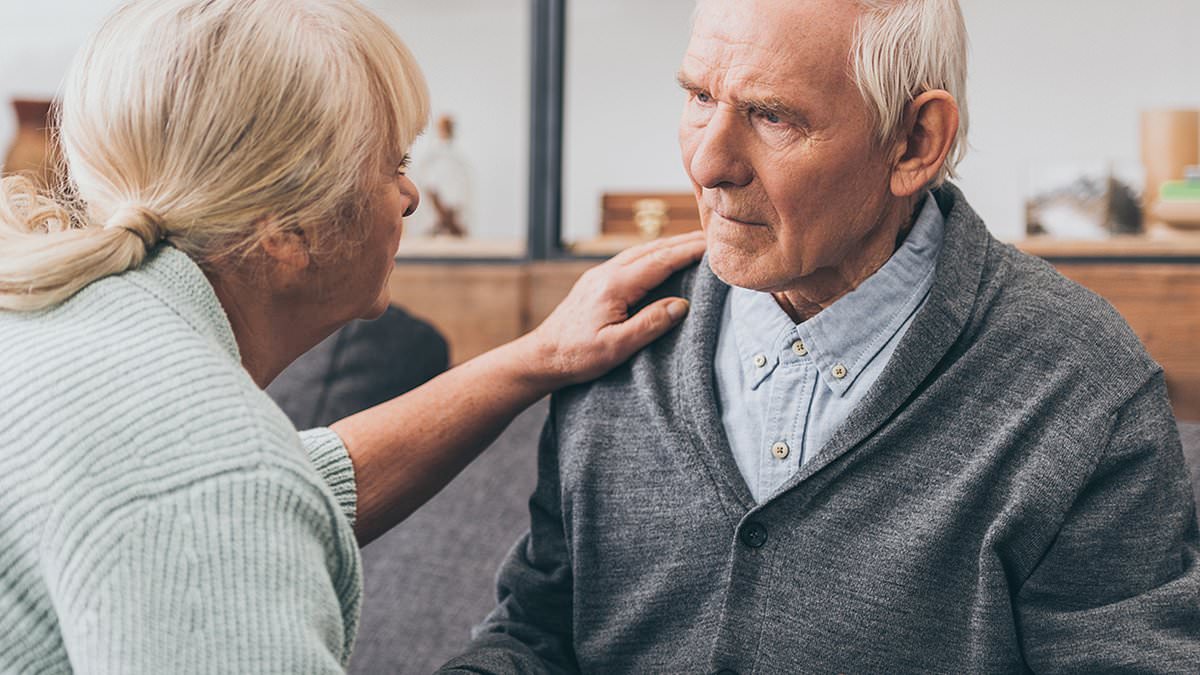If you’re increasingly skipping social plans because you’re tired, it could be a sign you’re at risk of dementia.
A study suggests older people who are sleepy during the day or lack enthusiasm for activities due to fatigue are more likely to develop a syndrome linked to Alzheimer’s.
The condition is called motoric cognitive risk syndrome (MCR), and the authors suggest that there could be a link between it and sleep problems.
People with the syndrome walk slowly and may have memory problems, but the new study suggests they may also be suffering from daytime sleepiness, and as a result, a reduced desire to go out and do things like socializing.
The lead author of the study, Dr Victoire Leroy from the of Albert Einstein College of Medicine in the Bronx, New York said: ‘There’s potential that people could get help with their sleep issues and prevent cognitive decline later in life.’
People diagnosed with MCR are two times more likely to develop Alzheimer’s or vascular dementia than people without the syndrome.
The NYC researchers polled more than 400 people over 65 about their sleep quality and watched them over a period of three years.
They found that people with poor sleep and disinterest in their daily activities were three times more likely to develop MCR than people who slept well.

Alzheimer’s disease is the most common cause of dementia. Aside from changes to sleep and energy levels, some of the early signs include confusion, forgetfulness and problems speaking

Roughly one in ten Americans over 65 years old have some form of dementia, according to research from Columbia University.
Certain forms of the disease, like Alzheimer’s, are predicted to grow in the coming years, affecting an estimated 13million Americans by 2050.
There’s still a lot that researchers don’t understand about what causes dementia.
But figuring out what some of the early signs of the disease are can help researchers understand the disease better, and hopefully treat it.
One of those early signs is a disruption to sleep, according to the study, which was published in the American Academy of Neurology’s journal, Neurology.
Study author Dr Leroy said: ‘Our findings emphasize the need for screening for sleep issues.’
Dr Leroy’s study included 445 people around age 76 who did not have dementia at the start of the screening.
Forty-two people had motoric cognitive risk at the beginning of the study, but had yet to qualify for more serious conditions.
Each participant filled out a survey at their sleep at the beginning of the study, which included questions about their sleep quality, duration and whether they had a hard time staying awake during the day.
During the course of the study, 36 people developed motoric cognitive risk syndrome.
A third of people who had a hard time staying awake during daily activities developed MCR, compared to just six percent of the rest of the participants.
After accounting for factors like age, depression and other health risks, they found that people who had low-enthusiasm for their daily activities and daytime sleepiness were three times more likely to develop the syndrome than people who didn’t have sleep problems.

About one in ten Americans over 65 currently have dementia. The Alzheimer’s association estimated that certain kinds of the disease are on the uptick. Alzheimer’s is expected to grow to reach 13million people by 2050
The study authors cautioned that their study had limitations. First, it only showed an association between sleep quality and MCR, it didn’t prove that poor sleep caused MCR.
Second, because their study only included a few hundred people, it needs to be performed again to make sure it holds true for everyone, Dr Leroy said.
Dr Leroy also added that since MCR was only identified in 2013, there is still a lot that scientists don’t understand about why it happens, and how it may lead into dementia.
Older studies have suggested that poor sleep is one of the earliest signs of dementia. It’s difficult to know if it’s a cause of dementia or a symptom of it.
Researchers from Harvard Medical School found that people who slept less than give hours per night were twice as likely to develop dementia than those who slept six to eight hours per night.
One theory, posited by Harvard Pilgrim Healthcare, is that if we don’t get adequate sleep, our brains don’t have enough time to clear out the waste it normally processes during a long period of shut eye.
This waste could then build up in the brain, dampening cells and causes changes that build up over time.
Whatever the mechanism may be, health authorities are clear about their sleep advice – get as much as you can as regularly as you can. According to the CDC, adults should get 7 or more hours of sleep each day.










